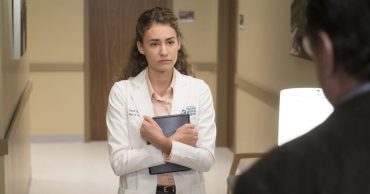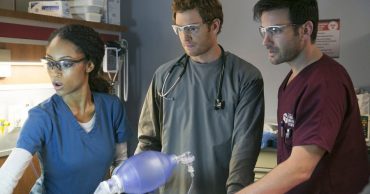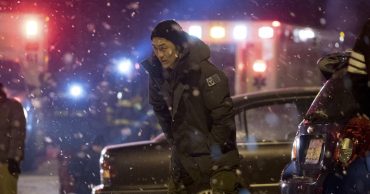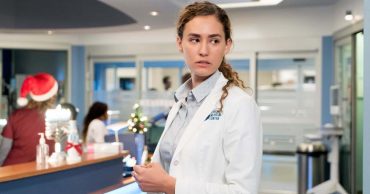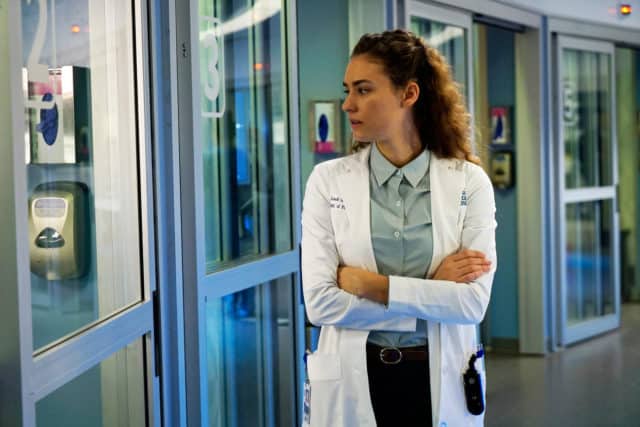
This week’s Chicago Med was all about the bonds between fathers and daughters. They’re hardly simple. Some have the best of intentions, some make honest mistakes, and others are so screwed up, they need Dr. Charles to intervene with an official diagnosis. But no matter how frayed that bond may be, there’s always a someone on either end of it making the effort to strengthen that bond. This goes all the way up to one of Chicago Med‘s own, Dr. Reese. Did she get a second chance with her father, or were medical and psychological circumstances too much?
Stop me when you’re heard this story before. Deadbeat dad wants to see his daughter on his deathbed (the amount of alliteration was unintentional). But what happens when that dad is a diagnosed psychopath? As Dr. Reese’s father waited for a heart that would never come, he was still trying to play mind games with Dr. Charles. How can Reese possibly feel comfortable hoping he lives? As a human being, that’s what she wants. As a daughter, she hopes that a new heart could give them more time to find something together, a workaround to his psychopathy. But on his deathbed, he continues to play on Reese’s emotions. And after watching a man with severe dementia die from an accidental exposure to fentanyl, Reese stops questioning if she is evil for wanting to take greater risks with her father’s life. It’s a terrible thing to intentionally endanger someone’s life, but to take a higher calculated risk? In any case, Dr. Rhodes pulled off a miracle, and Reese will get another chance with her father. But is it a good idea to take it?
Choi’s not big on second chances. He’s even less fond of third, fourth, and tenth chances. At April’s urging, he took his estranged sister in to get to know her better. They have not had a great relationship, as she never really felt at home in her adopted family. Bridging that divide means understanding what the other person has gone through. It is really impressive that Dr. Choi has continued to kids at the homeless camp. Especially if, and correct me if I’m wrong, he could lose his license for some of his treatments outside of the hospital. He’s dedicated to these kids, but he doesn’t know what they have been through. He’s never been homeless. He’s never, as Dr. Charles suspects is the case with Choi’s homeless cancer patient, had Attachment Disorder. In all likelihood, this is probably the reason that Choi’s sister never got along with him. It was nothing against him, it was a psychological condition brought on by her time in foster care. That kind of isolation is damaging, and unfortunately, there is no real treatment. There is only patience, and a willingness to accept the other’s point-of-view. That’s what the Choi siblings are able to do for the homeless cancer patient, and it probably saved his life.
I’m seriously wondering if Dr. Halstead and Dr. Manning are meant to work together. While they have good chemistry, their personal relationship isn’t perfect, and their professional relationship isn’t that much better. They disagree from the beginning on a case of a mother and son with OCD. The mother would rather get a quick, incorrect diagnosis than admit a hereditary illness. Dr. Manning chooses to placate the parents in order to properly treat their son. While this may have been the right call for the case, the sequence of events show a pattern in Manning’s behavior. I hate to say it, but Halstead has a point. I couldn’t quite put my finger on what was going wrong with this pairing until he pointed it out. Dr. Manning does indeed have a habit of making, and pushing, all the professional and personal decisions between them. Dr. Manning’s decision on the case worked to a point, but a full set of honest facts is what saves lives. The jury’s still out on this pair.
The father-daughter relationship is complicated. Reese’s relationship with her father is not to be envied, and every other case in this episode was a lesson in no good situations. In comparison, Dr. Rhodes’s contentious relationship with his dad is surprisingly simple. The potential pairing of Dr. Bekker and Dr. Rhodes’s father died a mercifully quick death. Thank goodness she has more dignity. It was almost a relief to see a relationship where you could clearly point to the wrong and wronged parties.
But the true hero of this episode is Ms. Goodwin, who walked into a hospital board meeting and told them what’s what after they made a monetary decision that could have cost lives. It was all very professional and courteous. Ms. Goodwin has far more patience than those people deserve, but it might not be enough. No one likes being told they’re wrong, and even though Goodwin is right, pointing this out to the board during budget negotiations could cost her dearly.
We’ll see how the situation with Reese and her father, as well as the continued effects of the hospital budget cuts, manifest as we move closer to the end of the season.
 Follow Us
Follow Us
